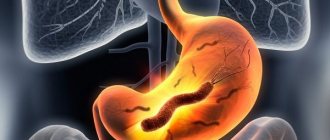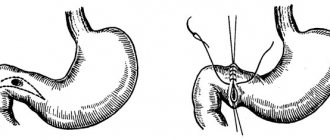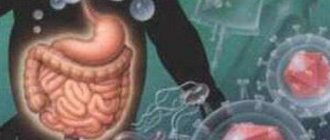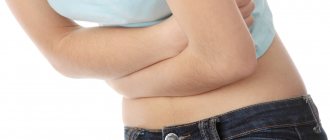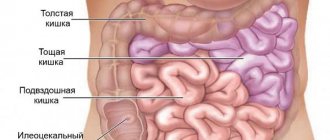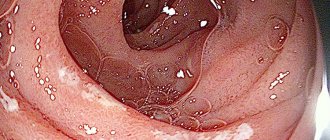Gastroenteritis
Gastroenteritis is a disease in which inflammation of the mucous membranes of the digestive tract begins. If symptoms of gastroenteritis appear (frequent vomiting and diarrhea, fever, fatigue and loss of appetite), immediately contact your doctor to prevent complications. The pathology is especially difficult in children.
General information about the disease
Gastritis and gastroenteritis are associated with inflammation of the mucous membranes. With gastritis, only the mucous membrane of the stomach becomes inflamed, while with gastroenteritis, the mucous membrane of the stomach and small intestine becomes inflamed.
Ways of transmission of gastroenteritis:
- Fecal-oral. It involves contact with a pathogen that is released into the environment with particles of feces or vomit and enters the body through the mouth with contaminated food and water. In everyday life, gastroenteritis is transmitted through dishes, toys, hygiene items and handshakes.
- Airborne dust. The disease is transmitted by inhaling air or dust containing infectious agents. The infection gets into the air when you sneeze or spit.
- Transmissible. Involves transmission of infection through insect bites.
Diagnostics
The diagnosis is made based on the existing symptoms (loose stools, vomiting, fever, etc.). Additionally, medical history data is taken into account, for example, recent travel, drinking water from open reservoirs, contact with sick people, etc. Oral use of antibiotics (within the last two to three months) should raise suspicion of Clostridium difficile infection.
To clarify the etiology of gastroenteritis, a clinical examination of stool is performed:
- enzyme immunoassay (search for antibodies to certain pathogens);
- PCR method (polymerase chain reaction) to identify pathogen antigens;
- bacteriological examination of stool, placing it on nutrient media and determining sensitivity to antibiotics.
A blood test may be prescribed to check the level of electrolytes, liver and kidney function indicators (transaminases, urea, creatinine, etc.). A complete blood count with white blood cell count helps differentiate bacterial and viral gastroenteritis.
Fibrogastroscopy is necessary for the diagnosis of ulcers, erosions and neoplasms of the gastric and duodenal mucosa Photo: Pavel L Photo and Video / Shutterstock.com
Fibrogastroscopy is necessary for the diagnosis of chronic gastroenteritis. It allows you to identify microdamages of the gastrointestinal mucosa, ulcers, erosions, and neoplasms.
Causes
Gastroenteritis is divided into four types depending on the pathogens that cause the disease.
Viral gastroenteritis
The most common viruses that cause infectious gastroenteritis are:
- Rotavirus. A highly contagious virus, in young children it causes severe diarrhea and vomiting, which leads to dehydration. Typically, rotavirus affects children from 3 to 15 months. Adults become infected with rotavirus, but the disease is mild. To reduce the risk of getting sick or alleviate the course of the pathology, young children are vaccinated against rotavirus.
- Norovirus. Infects people of all ages. The virus is transmitted through direct contact with a sick person through household items, contaminated food or water.
Less commonly, gastroenteritis is caused by other types of viruses: astrovirus, adenovirus, cytomegalovirus and enterovirus.
Bacteria
Infectious gastroenteritis, which is caused by bacteria, is less common than viral gastroenteritis. The main causative agents of bacterial gastroenteritis:
- Salmonella. Infection occurs through consumption of unpasteurized milk, undercooked poultry meat and raw eggs, and through contact with reptiles and birds.
- Campylobacter. Infection occurs through contact with an infected animal.
- Shigella. The source of the bacteria is the excrement of sick people or already recovering carriers. The carrier of infection is flies.
Parasites
Intestinal parasites (giardia, dysenteric amoeba, cryptosporidium) cause gastroenteritis when they attach to the mucous membrane of the stomach or intestines.
Non-infectious causes
Crohn's disease
The main causes of non-infectious gastroenteritis:
- use of medications;
- the body's reaction to certain foods (for example, lactose intolerance, celiac disease);
- Crohn's disease;
- poisoning with stale food.
GASTROENTERITIS
GASTROENTERITIS
(
gastroenteritis
; Greek gaster stomach + enteron intestine + -itis) is a clinical and morphological syndrome caused by a pathological process (usually inflammation) of the mucous membranes of the stomach and small intestine. Since usually in a wedge, in practice there is a combined lesion of the intestinal mucosa, G. is considered as a type of gastroenterocolitis (see). At the same time, official statistics take G. into account as an independent nosological form. Acute G. is often a syndrome of a number of infectious diseases or is caused by the action of toxins, poisons (eg, heat-resistant enterotoxins, poisonous mushrooms), and also occurs under the influence of allergies.
Chron. G. should be differentiated with hron, gastritis (see), hron, enteritis and hron, enterocolitis (see Enteritis, enterocolitis). Gastroenterocolitis, a combined lesion of the stomach and intestines, is often possible.
Infectious G. is caused by various highly pathogenic and weakly pathogenic pathogens (E. coli, B. proteus, Vibrio parahaemolyticus, Cl. perfringens, staphylococci, enterococci, viruses, etc.).
For the clinic of acute G., an acute or very acute onset is typical, the appearance of nausea, repeated vomiting, frequent profuse watery bowel movements mixed with mucus, occasionally blood, symptoms of intoxication, chills, weakness, dizziness, headache, fever. The incubation period for infectious G. is often short - several hours, less often 1-5 days.
Treatment is usually carried out in an infectious diseases hospital and consists of gastric lavage and diet. For severely ill patients, detoxification and antibacterial therapy is indicated.
For gastroenteritis in children
The cause of the disease, in addition to the above factors, may be overeating, unusually spicy or rough food, consumption of unripe fruits, etc. Sometimes severe intoxication develops, reminiscent of the picture of toxic dyspepsia (see Dyspepsia), when vomiting occurs even after drinking water; Oliguria, proteinuria are observed, acetone and casts appear in the urine. Against the background of severe dehydration and electrolyte imbalance, signs of irritation of the meninges, convulsions, and symptoms of damage to the cardiovascular system (deafness of heart sounds, rapid and weak pulse, decreased blood pressure) may occur. With a mild course of the disease, the child’s condition quickly improves; with a severe case, the recovery process is delayed. Symptoms of G. occur in the initial period of many childhood diseases, including appendicitis and intussusception: intense and increasing abdominal pain, mild intoxication in the initial period of appendicitis, stool and gas retention, satisfactory condition and normal temperature during intussusception. Differential diagnosis with infectious and somatic diseases is carried out taking into account the wedge, the picture of general and epidemiological data, anamnesis and laboratory examination materials.
Sick children are hospitalized in an infectious diseases hospital. In mild cases, bed rest is prescribed, a water-tea diet for 6-12 hours, then easily digestible food with limited fat and fiber; After a few days, they are transferred to regular food. In severe forms of G., after gastric lavage, a water-tea diet is prescribed for 18-24 hours. In case of severe dehydration, it is advisable to drip the introduction of saline solutions, taking into account the state of water-salt balance and acid-base balance. According to indications, cordiamine and caffeine are prescribed subcutaneously; strophanthin or corglycone is added to the infusion fluid. Antibacterial drugs are used taking into account the sensitivity of the pathogen to them. It is mandatory to prescribe eubiotics (enteroseptol, mexoform), vitamins, especially group C and B, stimulants (pentoxyl, plasma transfusion), blood, gamma globulin injections, etc.
Forecast
usually favorable.
Bibliography:
Blyuger A.F., Novitsky I.N. and Terebkova Z.F. Salmonellosis, Riga, 1975, bibliogr.; B u-d a g i n F. E. Food toxicoses, toxic infections and their prevention, p. 99, M., 1972, bibliogr.; Nisevich N. I. and Avanesova A. G. Dysentery and other intestinal infections in young children, M., 1962, bibliogr.; Guide to gastrointestinal diseases in children, ed. N. I. Nisevich, p. 316, M., 1969; Management
on infectious diseases, ed.
A. F. Bilibina and G. P. Rudneva, p. 163, M., 1962; G ha d y GF a. To eu sch GT Pathogenesis of bacterial diarrheas, New. Engl. J. Med., v. 285, p. 831, 891, 1971, bibliogr.
V. I. Pokrovsky, V. P. Mashilov; B. M. Vitebsky (ped.).
Symptoms of gastroenteritis
For gastroenteritis, the incubation period lasts from 3 hours to 4 days, but initial symptoms appear within the first three days after infection. Signs of the disease begin suddenly. The manifestation of symptoms depends on the causative agent of the disease and its amount in the body, on the state of the patient’s immunity and individual health characteristics.
In adults
The first symptoms of gastroenteritis in adults:
- nausea and/or vomiting;
- bloating and pain in the navel, flatulence;
- diarrhea (stool about 20 times a day) with the possible presence of mucus and blood;
- hyperthermia up to 40 °C;
- fatigue, loss of strength, lethargy, loss of appetite.
In children
In children, gastroenteritis manifests itself as repeated nausea and foul-smelling, discolored diarrhea. A sharp increase in body temperature sometimes leads to the development of febrile seizures in children under 3 years of age. Pain sensations appear in the navel area, which arise unexpectedly, intensify while eating and fade after a while.
Important! Young children develop dehydration due to repeated vomiting and diarrhea over several hours. If a child does not drink well, there is decreased urination, lethargy, rapid breathing and a sunken fontanel, this is a reason to immediately seek emergency help.
What is hemorrhagic gastroenteritis?
Hemorrhagic gastroenteritis is an acute disorder in dogs characterized by vomiting and bloody diarrhea. In most cases, it occurs suddenly in dogs that do not have other diseases. The main and most alarming clinical sign is an abundance of bloody diarrhea, often bright red in color. Some dogs begin to experience abdominal pain, decreased appetite, lethargy (fatigue), or fever. The disease can occur in dogs of any breed, age, size and gender, but is most common among toy and toy breeds. Most often, miniature French poodles, miniature schnauzers, Yorkshire terriers, Pekingese, Sheltie and Cavalier King Charles spaniels suffer from hemorrhagic gastroenteritis.
Forms of gastroenteritis
The extent of the disease is related to the severity of damage to the mucous membranes and depends on the intensity of the symptoms that appear. There are three forms of disease development:
- Mild degree. Vomiting and diarrhea occur rarely, about 3 times a day. Body temperature does not increase.
- Average degree. Symptoms progress, vomiting and diarrhea become more frequent (up to 10 times a day), body temperature rises.
- Severe degree. The frequency of diarrhea and vomiting increases up to 15–20 times, fever is noted (up to 40 °C). In case of severe disease, symptoms and treatment of gastroenteritis in adults should be monitored by a doctor. Lack of professional assistance from a medical professional leads to serious complications.
Based on the duration of the disease, gastroenteritis occurs:
- Spicy. Infectious, non-infectious and parasitic. The acute form of the disease occurs due to the consumption of spoiled foods, food without proper heat treatment, or poorly washed vegetables and fruits. The disease begins abruptly, the symptoms are pronounced.
- Chronic. A form of gastroenteritis of non-infectious etiology, exacerbation phases alternate with asymptomatic periods.
Briefly about prevention
To reduce the risk of gastroenteritis and other inflammatory diseases of the digestive tract, it is enough to follow the advice of your doctors.
- You should wash your hands with laundry, tar or antibacterial soap before each meal and after visiting the street or the restroom.
- The consumption of foods with a low degree of heat treatment (rare steaks, sushi) should be limited to 1-2 times a month.
- During the summer, you can only swim in specially designated areas equipped with a “Swimming Allowed” sign.
- If it is impossible to wash your hands, you can use antibacterial gels or wipes for emergency treatment.
- Before consumption, vegetables and fruits should be washed not with running water, but with boiled water (preferably with soap).
Gastroenteritis is a fairly common disease of the gastrointestinal tract in adults. In most cases, the disease goes away completely in 7-10 days, but if treated incorrectly or if the immune system is severely weakened, serious complications can occur, so patients with this diagnosis are always offered hospitalization in an infectious diseases hospital.
Traditional therapies
Taking tests
Before prescribing treatment, the necessary tests are first taken to determine the location and cause of the disease (virus, bacteria, parasite).
Treatment of mild and moderate forms does not require a hospital stay and is carried out at home. Treatment tactics that are followed after gastroenteritis is diagnosed:
- Eliminating the root cause of the disease. The option is possible for bacterial (antibiotic therapy), parasitic (anthelminthic drugs) and non-infectious reasons (exclusion from the diet of foods that cause symptoms of the disease).
- Relieving symptoms and eliminating the consequences of pathology (rehydration and diet, taking medications that stop vomiting and diarrhea).
Rehydration
Replenishing fluid deficiency in the body plays a key role in restoring health. During periods of frequent diarrhea and vomiting, strictly control the amount of fluid you drink. The liquid is replenished with water, herbal decoctions, unsweetened compotes and tea.
It is recommended to drink frequently and in small portions, otherwise there is a high probability of triggering a gag reflex with large volumes of liquid.
Important! If there is a risk of dehydration, drink alkaline mineral water. With large losses of fluid, essential salts and minerals (calcium, sodium, potassium, magnesium) leave the body.
Diet
In the first hours after the onset of symptoms of the disease, avoid eating. After relief of symptoms and the appearance of appetite, it is recommended to introduce light dishes into the diet: vegetable or chicken broth, oatmeal with water, banana, rice. Then the diet expands to include boiled chicken, other cereals and vegetables. At the end, boiled eggs, lean fish and meat are introduced.
After complete recovery, the usual diet is resumed with some restrictions for a couple of weeks:
- Refrain from eating fatty, sweet and spicy foods.
- During illness, caffeine is avoided, and during the recovery period it is strictly limited.
- During the period of illness and further recovery, alcohol and nicotine are prohibited.
- Dairy products are prohibited (fermented milk products promote speedy recovery).
To relieve symptoms, antiemetics and antidiarrheals are used, and in the case of bacterial gastroenteritis, antibiotic therapy is prescribed by the doctor. All medications are taken only after consultation with a therapist or children's doctor (pediatrician).
A hunger strike is declared!
| Symptoms of bacterial gastroenteritis: | |
| high body temperature; chills; headache; muscle aches; cramping abdominal pain, frequent vomiting; diarrhea. | |
Self-medication for gastroenteritis is strictly prohibited. Antidiarrheal drugs, which are now actively advertised and sold without a prescription in any pharmacy, cannot be used without a doctor’s prescription. The mechanism of action of some drugs is to block intestinal motility - 2 capsules “turn off” the intestines for 2-3 days. If you start treating gastroenteritis with this medicine, it will lead to a sharp deterioration in your health, intoxication and an increase in body temperature.
Treatment is prescribed only by a doctor and begins with gastric lavage with a special solution. After this procedure you need to drink a lot of water. In case of severe general intoxication, rehydration therapy is carried out. For viral gastroenteritis, antiviral drugs are prescribed, followed by drugs that restore the intestinal flora.
The key to a quick recovery is bed rest and a strict diet. The menu includes low-fat broth, water-based porridge, crackers and unsweetened tea.
If you strictly follow the doctor’s recommendations, after a ten-day course of procedures, the gastrointestinal tract of adults is completely restored and there will be no negative consequences in the future. The exception is patients with low levels of antibodies; in them, the infection may recur or become chronic with alternating exacerbations and periods of remission.
Article on the topic
Summer disorder, or How to escape from food-borne intestinal infections
In children, after suffering from viral gastroenteritis, relative immunity appears in the body, protecting against re-infection.
Folk remedies
To speed up recovery, alternative medicine treatment methods are used (doctor's prescriptions are not canceled). The approach is designed to eliminate fluid deficiency through decoctions and infusions of herbs and berries. An infusion of mint and blackhead helps reduce inflammation of the mucous membrane, and a decoction of cranberries has antiseptic properties.
Among the methods of treating gastroenteritis with folk remedies, warm compresses, rice or ginger infusions are noted.
Warm compresses
Warm compresses are used to reduce pain from cramps. Use a heating pad or a piece of gauze or towel soaked in hot water.
To alleviate the condition, apply a hot object to the disturbing area, cover with a blanket or woolen scarf and leave for 10–15 minutes. Treatment is repeated 3–5 times a day.
Rice water
White rice
Rice water helps with diarrhea. The composition is rich in vitamins and microelements, helping to compensate for their deficiency in the body. The rice broth envelops and protects the mucous membrane from further damage.
To prepare rice water from cereals, boil 1 tablespoon of rice in 1.5 liters of water for about an hour, then strain the mixture. The resulting rice water is brought to a boil again, cooled to a comfortable temperature and taken a quarter glass every 2 hours.
Ginger
Ginger root strengthens the immune system, soothes damaged intestinal mucosa and reduces the gag reflex.
Important! Ginger is contraindicated for people with cholelithiasis, liver cirrhosis and stomach ulcers.
To treat gastroenteritis, prepare ginger tea or decoction. Grind fresh ginger, pour boiling water over it, let it brew for 5-10 minutes, strain and consume in small portions.
Treatment of gastroenteritis
There are no special medications for the treatment of intestinal infections. Patients are prescribed medications that will relieve the symptoms of inflammation and increase immunity.
Therapy is carried out in the following areas:
- Destruction of the pathogen.
- Restoration of water-lipid balance.
- Reducing the intensity of symptoms of the disease.
- Removing intoxication from the body.
- Boosting immunity.
- Normalization of the functioning of the digestive organs.
In addition to taking medications, traditional therapy methods can be used in treatment. It is important to follow a diet. If the disease was caused by bacterial flora, then it is necessary to take antibiotics. They are prescribed after tests have been completed.
The classic therapeutic regimen is as follows:
- Drugs to eliminate dehydration. Regidron is most often used.
- Sorbent agents. They allow you to remove toxins from the body, relieve symptoms of poisoning, and rid the intestines of waste products of pathogenic flora. To do this, the patient must take drugs such as Enterosgel, Smecta, Polyphepan, Neosmectin.
- Digestive enzymes. They are prescribed when inflammation is caused by rotavirus infection. Taking medications allows you to normalize digestion, prevent the development of vitamin deficiency, and improve absorption in the small intestine. To achieve these goals, the patient is prescribed Mezim, Pancreatin, Creon.
- Medicines to stop diarrhea. This could be Loperamide, Imodium, Lopedium.
- Prebiotics. Taking them helps normalize intestinal microflora and improve immunity. The drugs of choice are: Linex, Laktiale, Laktovit, Bifidumbacterin, Bifiform, Turbiotic, Hilak Forte.
- Prokinetics of Central action. They help stop vomiting, reduce nausea, and relieve the feeling of heaviness in the stomach. Such medicines include: Cerucal, Motilal, Motilium.
- Medicines to lower body temperature: Paracetamol, Citramon, Panadol, Ibuklin.
- Antispasmodics. They eliminate pain in the intestines as they relax its muscles. These are medicines such as: Drotaverine, Spazmalgon, No-shpa.
Depending on the type of disease, the treatment regimen will differ:
- If gastroenteritis was provoked by viruses, then the patient is prescribed antiviral drugs that suppress the activity of pathogenic flora and help reduce signs of the disease. These may be drugs such as Arbidol and Laferobion. The patient will also have to take interferons aimed at increasing immunity, for example, Genferon or Viferon.
- Antibiotics are prescribed for gastroenteritis caused by microbial flora. They destroy bacteria and prevent them from multiplying.
- If a patient is diagnosed with eosinophilic gastroenteritis, then he is advised to take antihistamines, for example, Suprastin, Zyrtec, Polezin.
- For parasitic gastritis, take anthelmintic drugs, for example, Albendazole or Vermox.
Possible complications
In the absence of proper treatment, serious complications develop:
- Dehydration. Causes many problems, including death. Frequent vomiting and diarrhea lead to disruption of the body's water-salt balance. If the deficiency of fluid, vitamins and minerals is not replenished, further complications develop: convulsions, cerebral edema, renal failure, coma. Then comes death. It is necessary to carefully monitor the amount of fluid ingested and promptly diagnose and prevent dangerous signs of dehydration: dry lips and oral mucosa, small volume of urine, lethargy, sunken eyes.
- Sepsis. If the infection enters the bloodstream and spreads throughout the body, it can be fatal.
- Chronic gastroenteritis. Causes an advanced and untreated acute form of the pathology.
- Asymptomatic carriage. There have been cases where, after the symptoms of the disease disappeared, a person remained a carrier of the infection and infected others.
- There have been cases where reactive arthritis, Guillain-Barré syndrome and renal failure occurred after gastroenteritis.
Causes of gastroenteritis
Infectious and non-infectious causes can provoke the development of gastroenteritis.
The functioning of the intestines and stomach can be disrupted by the following factors:
- Viral flora: rotaviruses, caliciviruses, intestinal adenoviruses, astroviruses, coronoviruses.
- Bacteria: campylobacter, shigella, salmonella, E. coli.
- Protozoa microorganisms: intestinal lamblia, dysenteric amoeba, cryptosporidium.
- Helminths: crooked heads.
- Toxic substances: mushrooms (false honey mushrooms and fly agarics), sublimate, arsenic, fish products (mackerel caviar and burbot liver).
- Foods that have a high allergic threshold: eggs, strawberries, crab meat.
- Medicines: NSAIDs, antibacterial drugs, sulfonamides, iodine and bromine preparations.
Risk factors for the disease
Gastroenteritis is a disease that develops due to inflammation. It occurs under the influence of certain risk factors:
- Bad habits: alcohol abuse, smoking, drinking strong coffee and carbonated drinks. Under their influence, the mucous membrane is damaged, swells and begins to suffer from insufficient blood supply.
- Eating rough, spicy or too hot food. It could be mustard, pepper, vinegar. They irritate the mucous membrane of the digestive system, causing a slight tissue burn. It is at the sites of such damage that an inflammatory reaction occurs.
- Chronic infectious diseases of the nasopharynx, oral cavity, respiratory system, as well as tuberculosis.
- Exposure of the body to radiation during treatment.
- Taking antibacterial drugs. It is especially dangerous to self-medicate, since the irrational use of antibiotics leads to disruption of the intestinal microflora. Under such conditions, pathogenic agents multiply faster.
- Nutritional features. Allergenic foods can provoke gastroenteritis: milk, chocolate, exotic dishes, eggs. Sometimes inflammation develops due to overeating, or due to eating carbohydrate, fatty, salty or spicy foods.
- Intestinal dysbiosis.
- Obesity, iron deficiency anemia, gout and other dysmetabolic disorders.
Representatives of pathogenic flora primarily attack weak areas of the digestive system, in which protective mucus is not produced properly. They multiply in the digestive organs, provoking an inflammatory response. Swelling occurs in this place, which causes pain. This is how gastroenteritis develops.
